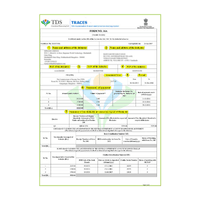Income Tax Return Filing For NRIs – Fast, Accurate & Compliant
Stay worry-free with expert-assisted ITR filing for NRIs under FEMA & Indian Tax Laws.

Who can file NRI ITR with us?
Salaried NRIs
Income from jobs abroad and property/rent in India.
NRIs with Capital Gains
Stocks, Mutual Funds, Real Estate
Freelancers / Consultants
Remote professionals earning globally
RNORs
Recently returned to India
NRIs with Foreign Assets
FBAR & Schedule FA compliance
NRIs Selling Property in India
TDS Refunds & Capital Gains Filing
Foreign Income + Business Income
Dual-source earners
Revised / Belated ITR for NRIs
Fix or file missed returns
Filing Income Tax Returns in India for NRIs
Imagine this. You’re sitting abroad, sipping coffee, when an email pops up from your bank in India. TDS deducted.
You shrug it off… until tax season comes around and you realize you’re supposed to file an ITR in India. The clock is ticking. The rules sound complicated. And you have no idea where to start.
That’s where MostlyNRI comes in. We’re going to walk through when NRIs need to file, how to do it, what deadlines you must remember, and how to avoid penalties.
By the end, you’ll know exactly how to handle NRI tax filing in 2025 without the stress.

Do NRIs Need to File Income Tax in India?
Here’s the short answer: Yes… if you have taxable income in India. But the definition of “taxable” often confuses people.
Under the Income Tax Act, NRIs are taxed in India only on income earned or received in India. That means:
-
Salary for services rendered in India
-
Rental income from property in India
-
Capital gains from selling property, shares, or other assets in India
-
Interest on NRO accounts (NRE account interest is exempt)
-
Business income from operations in India
Example: If you live in Canada and earn rent from your apartment in Mumbai, that rent is taxable in India. If you earn a salary in Canada and it’s credited directly to a Canadian bank account, India won’t tax it.
Rule of thumb: If the money touches Indian soil—physically or digitally—it may be taxable.
How Filing Works with MostlyNRI
Upload Documents or Enter Data
Share your income and investment details securely.
We Analyze & Prepare Your ITR
Our expert team reviews your case thoroughly.
You Review & Approve
Check your return summary before we file.
We File & E-Verify It for You
Your ITR is filed and verified – no hassles.
Get Refund Tracking + Post-Filing Support
Stay updated even after filing.
Documents Required
To file income tax returns in India, NRIs need to have the following documents ready

PAN Card
Permanent Account Number (PAN) is mandatory for filing tax returns.

Passport
Proof of residency status.

Bank Statements
Details of all bank accounts held in India.

Investment Details
Information on investments and assets in India.

Form 16/16A
Certificates of TDS for salary and other incomes.

Form 26AS
Annual tax statement that consolidates all the tax-related information.
Tax Filing Deadlines for NRIs in 2025
Deadlines matter. Miss them, and you could face penalties or even lose the chance to carry forward losses.
For Assessment Year 2025-26 (Financial Year 2024-25), here’s what you need to know:
| Filing Type | Last Date | Penalty if Missed |
|---|---|---|
| Individual NRI without audit | July 31, 2025 | ₹1,000 (if income < ₹5L) / ₹5,000 (if income > ₹5L) |
| NRI requiring audit | October 31, 2025 | Same as above |
| Belated return | December 31, 2025 |
Same penalties + interest |
Pro tip: Start early. The Income Tax e-filing portal often slows down near the deadline.
If the government extends the date (it happens sometimes), it’s usually announced in late July. But don’t count on it.
Let Our Experts Handle Your NRI ITR Filing
End-to-end filing, maximum refunds, and full compliance with Indian tax laws.
Types of Income Taxable for NRIs
NRIs are liable to pay tax on income earned or accrued in India.
Income from Salary
If you receive salary income in India or for services rendered in India.
Rental Income
Income from property located in India.
Capital Gains
Profits from the sale of capital assets located in India, such as real estate or shares.
Interest Income
Interest earned on savings accounts, fixed deposits, and other investments in India.
Other Income
Any other income earned in India, such as dividends from Indian companies or earnings from business operations.
How to File
- Determine Residential Status: Determine your residential status as per the Income Tax Act, as it affects your tax liability.
- Choose the Correct ITR Form: Depending on your source of income, select the appropriate ITR form. Typically, NRIs use:
- ITR-2: For those who do not have income from business/profession.
- ITR-3: For those who have income from business/profession.
- Download and Fill the Form: Download the applicable ITR form from the Income Tax Department’s website and fill in the required details.
- Report All Income: Report all income earned in India and ensure that all deductions and exemptions are accurately claimed.
- Pay Tax: Calculate your tax liability and pay any outstanding tax dues using the challan system (Challan 280).
- Verify and Submit: Verify all the details and submit the form online through the e-filing portal of the Income Tax Department.
- E-Verification: After submission, complete the e-verification process using Aadhaar OTP, net banking, or by sending a signed ITR-V to CPC, Bangalore.
Key Considerations
- Double Taxation Avoidance Agreement (DTAA): NRIs can benefit from DTAA, which allows them to avoid being taxed twice on the same income. Ensure you claim the tax credit if applicable.
- Section 80C Deductions: NRIs can avail deductions under Section 80C for investments like ELSS, PPF, and life insurance premiums.
- Foreign Income: NRIs do not need to report foreign income unless it is received in India.
Conclusion
Filing income tax returns in India as an NRI requires careful consideration of various factors, including your residential status, the type of income earned, and the applicable deductions. By following the outlined steps and ensuring proper documentation, NRIs can comply with Indian tax regulations and avoid any legal complications. Consulting with a tax professional can further simplify the process and ensure accuracy.
Loved by 2000+ NRIs
Frequently Asked Questions
Do NRIs need to file income tax return in India?
Yes, NRIs must file an income tax return in India if they have income that is taxable in India. This includes income earned or received in India, such as rent from property, capital gains from selling assets, salary for work performed in India, or interest from NRO accounts. Even if tax has already been deducted at source (TDS), filing an ITR helps you claim refunds, carry forward losses, and maintain proper compliance records. If you have no taxable income in India, filing is not mandatory, but it can still be beneficial in certain cases.
Which ITR is applicable for NRI tax filing?
The applicable ITR form depends on the type of income you have in India:
-
ITR-1 (Sahaj): Not applicable to NRIs.
-
ITR-2: Most commonly used by NRIs with income from salary, pension, house property, capital gains, or other sources.
-
ITR-3: Applicable if you’re an NRI with business or professional income in India.
-
ITR-4 (Sugam): Generally not applicable to NRIs as it’s for residents with presumptive income.
So, for most salaried NRIs, ITR-2 is the go-to form. If you run a business or have freelance income in India, ITR-3 may apply.
How much income is tax-free for NRIs?
For NRIs, the basic exemption limit is ₹2.5 lakhs for FY 2024-25 (AY 2025-26), just like resident Indians below age 60.
However, NRIs are not eligible for:
-
Rebate under Section 87A
-
Certain deductions available to residents (like for senior citizens)
-
Certain exemptions like agricultural income, unless conditions are met
Income earned abroad (salary abroad, foreign interest, etc.) is not taxable in India, unless received or accrued in India.
How can NRIs avoid taxes?
While you can’t “avoid” taxes, you can reduce your tax liability legally by:
-
Claiming DTAA (Double Taxation Avoidance Agreement) benefits if you’re taxed in both India and your resident country.
-
Investing in tax-saving instruments (e.g., ELSS, PPF, NPS – wherever allowed for NRIs).
-
Structuring your property sale properly to minimize TDS and capital gains tax.
-
Using Section 54/54EC exemptions for reinvesting capital gains from property sale.
-
Keeping NRE and FCNR accounts – income from these is often tax-free.
Consult a tax expert to ensure your strategies comply with Indian tax laws and FEMA.
What are the new rules for NRI in India?
Some recent updates and reminders for NRIs include:
-
Residential Status Change: As per new rules, NRIs who spend 120 days or more in India and have Indian income exceeding ₹15 lakhs in a year may be treated as Residents (not ordinarily resident).
-
Schedule FA: NRIs must disclose foreign assets and income held during the year.
-
High TDS on property sale: If an NRI sells property in India, TDS at 20% (plus surcharge and cess) applies, even if actual tax liability is less.
-
PAN-Aadhaar Linking is mandatory for compliance.
-
Form 10IEA to switch tax regimes is required for certain NRIs with business income.
These rules aim to improve tax transparency and compliance for globally earning individuals.
What is the penalty for not declaring NRI status?
Failing to declare NRI status can lead to:
-
Wrong tax computation: Your income may be taxed as if you’re a resident, leading to higher taxes.
-
Inaccurate ITR filing: Filing the wrong ITR form can result in notices or rejection.
-
Penalties for false declarations under Section 270A or 277, which can go up to 200% of tax under-reported or imprisonment in serious cases.
-
You may also lose out on DTAA benefits, TDS refunds, and deductions/exemptions specific to NRIs.
Always update your residential status correctly and disclose foreign assets if required.
How to transfer money from abroad to India without tax?
There’s no tax on transferring money from abroad to India if:
-
The money is transferred to your own NRE, NRO, or savings account
-
The source of funds is legal and declared
-
You are not bringing in money classified as income earned in India without declaring it
But once money is invested or earns income in India (interest, rent, capital gains), that income is taxable.
Using NRE accounts is the most common method for tax-free inward remittance, as interest earned is also tax-free in India.
Which section is NRI exempt from income tax?
Some key exemptions for NRIs under the Income Tax Act:
-
Section 10(4)(ii): Interest earned on NRE accounts is tax-free in India (as long as you’re NRI).
-
Section 10(15)(iv)(fa): Interest on FCNR deposits is tax-exempt.
-
Section 54 / 54EC: Exemption on capital gains from property sale if reinvested properly.
-
DTAA relief: Under Section 90/90A, NRIs can claim relief if tax has been paid in another country with a treaty.
Note: NRIs don’t get some benefits like Section 87A rebate, or certain deductions available to residents.
What are the tax rules for NRI returning to India?
When an NRI returns to India, their tax status doesn’t change immediately. For tax purposes, you are classified based on your residential status in the financial year. If you do not meet the stay requirements for being a resident (182 days or more), you’ll still be treated as an NRI or Resident but Not Ordinarily Resident (RNOR). RNOR status offers certain exemptions for income earned outside India. Once you become a resident, your global income becomes taxable in India. Planning your return date and understanding the RNOR benefit can help reduce your tax burden.
How much income is taxable for NRIs in India?
For NRIs, only the income that is earned or received in India is taxable. This includes salary for work in India, rental income, capital gains, business income from Indian operations, and interest from NRO accounts. Interest from NRE and FCNR accounts is exempt. The basic exemption limit for NRIs is ₹2.5 lakh, meaning if your total taxable income in India is below this, you generally don’t owe tax. However, in certain cases, filing is still required for compliance or to claim TDS refunds.
Do I have to file a tax return in India if I live in the USA?
If you live in the USA but have taxable income in India, you must file an ITR in India. The fact that you are a US resident doesn’t exempt you from Indian tax obligations for income arising in India. For example, if you earn rent from property in India or have capital gains from selling Indian shares, it will be taxed in India. You may also be eligible to claim relief under the India-USA Double Tax Avoidance Agreement (DTAA) to avoid paying tax on the same income twice.
What are the new rules for NRI in India?
In recent years, the government has tightened rules for determining NRI status and reporting requirements. One key change is the 120-day rule, which affects those with significant Indian income. Additionally, NRIs are now required to link PAN with Aadhaar (unless exempt), report certain foreign assets if they qualify as a resident, and comply with stricter TDS rules on property transactions. The focus has shifted toward ensuring better compliance and tracking of NRI investments and income.
What is the exemption limit for NRI?
The basic exemption limit for NRIs is ₹2.5 lakh per financial year, regardless of age. This is the same as for residents under 60 years old. If your total taxable income in India is below this threshold, you are not required to pay tax. However, if TDS has been deducted, filing an ITR is still necessary to claim a refund. Also, certain incomes, like capital gains, are taxable even if they are below the exemption limit.
Is it mandatory to declare NRI status in India?
Yes, declaring your NRI status is essential when filing your income tax return. The tax department needs to know whether you are an NRI, RNOR, or resident to determine which income is taxable and which exemptions apply. If you wrongly declare your status, it can lead to incorrect taxation, notices from the department, and even penalties. The declaration is made when you select your residential status in the ITR form.
Is money received from NRI taxable in India?
It depends on the nature of the money received. If it’s a genuine gift from an NRI relative, it is tax-free in India. Gifts from non-relatives are tax-free only if their value in a financial year does not exceed ₹50,000. However, if the money is payment for services, business transactions, or investment income, it is taxable. Also, money transferred from an NRI’s overseas account to your Indian account is not taxable if it’s not income but a remittance.
What is the 120-day rule for NRI?
The 120-day rule applies to Indian citizens or Persons of Indian Origin (PIOs) whose total Indian income exceeds ₹15 lakh in a financial year. Under this rule, if you spend 120 days or more (but less than 182 days) in India, you will be considered a resident for tax purposes. This change was introduced to prevent misuse of NRI status by high-income individuals spending long periods in India while avoiding tax residency.
What is the penalty for not filing ITR for NRI?
If you fail to file your ITR by the due date, you can face a late filing penalty under Section 234F – ₹1,000 if your total income is below ₹5 lakh, and ₹5,000 if it exceeds ₹5 lakh. Additionally, you may have to pay interest on any unpaid tax under Sections 234A, 234B, and 234C. Non-filing can also attract scrutiny notices and affect your ability to claim refunds or carry forward capital losses.
How much money can I receive from abroad tax free?
Money sent from abroad as a remittance is not taxable in India if it is not income but simply a transfer of your own funds or a gift from a relative. If it’s a gift from a non-relative, it’s tax-free only if the value does not exceed ₹50,000 in a financial year. However, if the amount represents income earned abroad and you qualify as a resident for tax purposes, it could be taxable in India.
How can NRI claim TDS refund?
If excess TDS has been deducted on your income in India, you can claim a refund by filing an ITR. The process involves reporting your actual income, matching it with the TDS shown in Form 26AS, and submitting the return through the e-filing portal. Once processed, the refund is credited directly to your bank account. Filing is the only way to recover excess TDS—there is no automatic refund without it.
